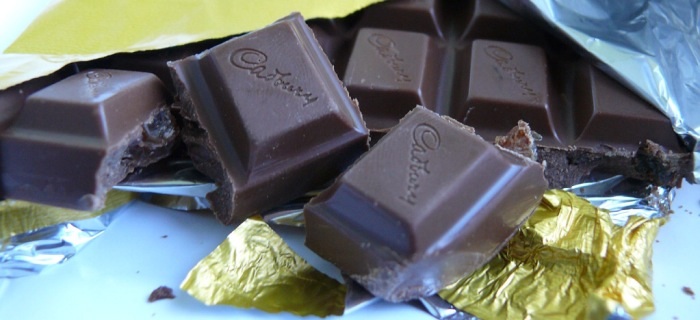The Case for Chocolate

It may be hard to believe but I went without chocolate once for nine months. I was pregnant and determined to eat only "healthy" foods. My diet consisted of organic fruits, vegetables, whole grains and legumes, with nary a chocolate bar in sight. The morning sickness (which, by the way, is all-day sickness) made quitting cold turkey seem fairly easy until it wore off four months into the pregnancy and the cravings began. I soon learned that while my house was a chocolate-free zone, out in the real world temptation was everywhere.
My sister-in-law had us over for dinner one night and, unaware of my chocolate withdrawal, served one of those perfect and expensive chocolate cakes you buy at upscale bakeries for dessert. It took tremendous will power but I didn't eat it. I sat on the couch with a piece of cake on my husband's fork and just inhaled the intoxicating scent of chocolate. I felt like a junkie--"Just a sniff, honey, please. It smells so good. Just another sniff."
The day after our daughter was born my husband brought me my favourite cake--the Belgian Mousse Torte from True Confections--a cake that excels above all other cakes for sheer chocolateness. Some women can't eat chocolate while they are breastfeeding because it gives their babies colic. Thank God my eating chocolate didn't faze my nursing baby in the least. Nine months of abstinence was long enough.
That near-year without chocolate refined my taste buds. Any old chocolate won't do anymore. I like darker chocolates now from the gourmet chocolate shops and the organic bars you buy at the health food store. Instead of gobbling, I appreciate the art of the chocolatier and savor every bite.
February is the ultimate month for chocolate. Whoever made up the rule that men must show their devotion to you by bringing you armfuls of candy in heart shaped boxes has my eternal gratitude.
To help you enjoy the Valentine's Day largess guilt-free, here are some scientific facts about chocolate that prove what we already know: A chocolate bar is a little piece of heaven.
Clearing chocolate's good name
Chocolate has gotten a bad reputation for causing everything from pimples to headaches. "Unfair," say some research scientists, and they have been working hard to dispel the myths. Various studies show that chocolate:
- doesn't cause acne
- isn't as bad for your teeth as most sweets. It contains an antibacterial agent that inhibits the formation of plaque
- doesn't cause migraines. Scientists theorize that it is situations, like PMS and stress, in which women tend to crave chocolate that trigger migraines, not the chocolate itself.
- doesn't cause sleeplessness. While a cup of coffee contains 140 mg of caffeine, a 1.4 oz chocolate bar only has 23 mg
Lactose intolerant? Eat chocolate
Are you unable to drink milk due to lactose intolerance? Stir some chocolate into your glass and chug away. Chocolate may improve your ability to digest milk by stimulating the enzyme that breaks down lactose.
The sweetest antioxidant
Are you popping vitamins A, C and E because you've heard how wonderful antioxidants are? They neutralize those nasty free radicals that cause damage to your cells and tissues and contribute to aging.
Guess what? Chocolate contains both phenols, the antioxidants believed to lower the risk of heart disease, and catechins. Catechins are potent antioxidants that can also be found in tea. The good news for chocoholics is that solid dark chocolate has four times as many catechins as brewed tea.
Who needs Prozac?
Feeling blue? Eat some chocolate. Phenylethylamine is an amino acid found in chocolate that acts as a painkiller and antidepressant. Both the phenylethylamine and anandamide in chocolate trigger the release of endorphins, the chemicals in our brains that make us feel good. Carbohydrates in chocolate stimulate the production of the neurotransmitter serotonin, which produces feelings of calmness and well-being.
The food of love
Casanova used chocolate during his seductions and we all know how successful he was. It is considered an aphrodisiac, maybe with good reason. Chocolate contains phenylethylamine, the same chemical that is released by our brains when we fall in love.
Eat chocolate, live longer
A Harvard study found that chocolate lovers live a year longer than people who don't indulge. If you eat chocolate one to three times a month you have a 36% lower risk of dying than someone who doesn't.
Eat it a much more reasonable three or more times a week and you have a 16% lower risk of dying than those who abstain from the pleasure. Researchers believe the reason for increased longevity may be the antioxidants in chocolate that reduce the risk of heart disease.
A cocoa cancer cure?
Researchers have found that cocoa helps prevent adverse changes in DNA and flavonoids found in chocolate are anti-carcinogens. In animal studies components of cocoa prevented cancerous cells from progressing into cancerous lesions. Epicatechin, which is found in chocolate, was shown to inhibit the formation of benign skin tumors in mice.
Virtual chocolate
Isn't technology a wonderful thing? With the advent of the Internet, chocolates from around the world are just a website away. Check out these URLs for unique chocolate gifts or go to www.yahoo.com and do your own search for the perfect candies to satisfy your cravings:
- http://www.chocolategallery.com - Send your beloved a chocolate telegram in solid milk chocolate.
- http://www.toefood.com - This company has spent 15 years making novel edible foot products out of Ghirardelli chocolate
- http://www.sweetimpressions.com - Order personalized chocolate coins to promote your business
- http://www.givechocolate.com - Join the chocolate-of-the-month club
- http://www.Cadbury.com.au and http://www.m-ms.com - Both of these sites have games an entire family of chocoholics can enjoy
Cathy Allison is a freelance writer and fulltime mother who lives in Vancouver, BC.
